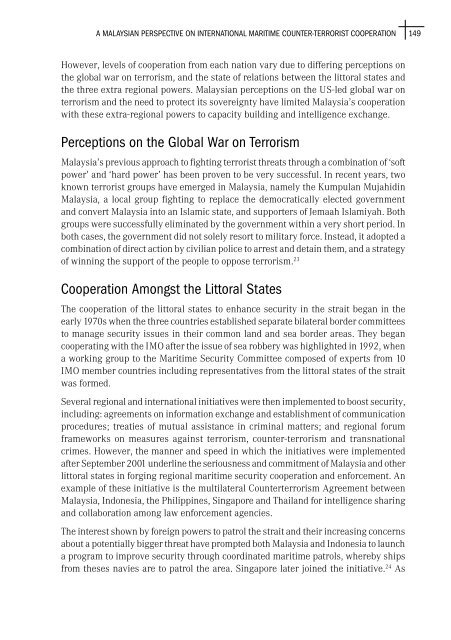Australian Maritime Issues 2007 - Royal Australian Navy
Australian Maritime Issues 2007 - Royal Australian Navy
Australian Maritime Issues 2007 - Royal Australian Navy
Create successful ePaper yourself
Turn your PDF publications into a flip-book with our unique Google optimized e-Paper software.
A Malaysian Perspective on International <strong>Maritime</strong> Counter-Terrorist Cooperation<br />
149<br />
However, levels of cooperation from each nation vary due to differing perceptions on<br />
the global war on terrorism, and the state of relations between the littoral states and<br />
the three extra regional powers. Malaysian perceptions on the US-led global war on<br />
terrorism and the need to protect its sovereignty have limited Malaysia’s cooperation<br />
with these extra-regional powers to capacity building and intelligence exchange.<br />
Perceptions on the Global War on Terrorism<br />
Malaysia’s previous approach to fighting terrorist threats through a combination of ‘soft<br />
power’ and ‘hard power’ has been proven to be very successful. In recent years, two<br />
known terrorist groups have emerged in Malaysia, namely the Kumpulan Mujahidin<br />
Malaysia, a local group fighting to replace the democratically elected government<br />
and convert Malaysia into an Islamic state, and supporters of Jemaah Islamiyah. Both<br />
groups were successfully eliminated by the government within a very short period. In<br />
both cases, the government did not solely resort to military force. Instead, it adopted a<br />
combination of direct action by civilian police to arrest and detain them, and a strategy<br />
of winning the support of the people to oppose terrorism. 23<br />
Cooperation Amongst the Littoral States<br />
The cooperation of the littoral states to enhance security in the strait began in the<br />
early 1970s when the three countries established separate bilateral border committees<br />
to manage security issues in their common land and sea border areas. They began<br />
cooperating with the IMO after the issue of sea robbery was highlighted in 1992, when<br />
a working group to the <strong>Maritime</strong> Security Committee composed of experts from 10<br />
IMO member countries including representatives from the littoral states of the strait<br />
was formed.<br />
Several regional and international initiatives were then implemented to boost security,<br />
including: agreements on information exchange and establishment of communication<br />
procedures; treaties of mutual assistance in criminal matters; and regional forum<br />
frameworks on measures against terrorism, counter-terrorism and transnational<br />
crimes. However, the manner and speed in which the initiatives were implemented<br />
after September 2001 underline the seriousness and commitment of Malaysia and other<br />
littoral states in forging regional maritime security cooperation and enforcement. An<br />
example of these initiative is the multilateral Counterterrorism Agreement between<br />
Malaysia, Indonesia, the Philippines, Singapore and Thailand for intelligence sharing<br />
and collaboration among law enforcement agencies.<br />
The interest shown by foreign powers to patrol the strait and their increasing concerns<br />
about a potentially bigger threat have prompted both Malaysia and Indonesia to launch<br />
a program to improve security through coordinated maritime patrols, whereby ships<br />
from theses navies are to patrol the area. Singapore later joined the initiative. 24 As
















